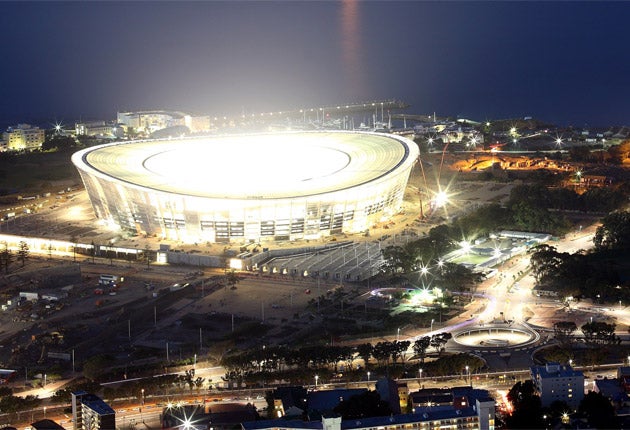South Africa 'must look past 2010'
Mark Fish admits hosts will struggle at their own World Cup and should focus on 2014

Your support helps us to tell the story
From reproductive rights to climate change to Big Tech, The Independent is on the ground when the story is developing. Whether it's investigating the financials of Elon Musk's pro-Trump PAC or producing our latest documentary, 'The A Word', which shines a light on the American women fighting for reproductive rights, we know how important it is to parse out the facts from the messaging.
At such a critical moment in US history, we need reporters on the ground. Your donation allows us to keep sending journalists to speak to both sides of the story.
The Independent is trusted by Americans across the entire political spectrum. And unlike many other quality news outlets, we choose not to lock Americans out of our reporting and analysis with paywalls. We believe quality journalism should be available to everyone, paid for by those who can afford it.
Your support makes all the difference.One month today, the draw for next summer's World Cup finals will be made amid much fanfare in Cape Town. Down there, as Africa prepares to stage the tournament for the first time, all is optimism; the new 68,000 capacity Green Point stadium, a semi-final venue set between Table Mountain and the Atlantic Ocean, is on schedule – if 125 per cent over budget – and should be formally handed over to the city council on 14 December.
Issues of security and transport for supporters continue to be points of discussion, and doubtless still will be when the tournament kicks off on 11 June. For South Africans involved in the actual football, however, the principal worry is the prospect of the national team – with the eyes of the world on them in that day's opening match – setting an unwanted record as the first host country ever to be eliminated at the group stage.
Mark Fish, once a centre-half for Lazio, Bolton and Charlton as well as South Africa, and an ambassador for the successful 2010 bid, is among the doubters. Having played in the 1998 World Cup and the winning Cup of Nations team two years earlier, he believes that the 1996 triumph was too much too soon.
"After being readmitted to world football in 1992, I think we won the Nations Cup too soon and lived on that for too long," he said over lunch here yesterday. "It stagnated after that and we're just playing catch-up. We talk about development, but having become a coach at a first division team here, I shouldn't need to be coaching players in how to control a ball, head a ball or where to be positioning themselves.
"I can only hope that with a good draw we can get a bit of luck and get through to the second round but it's more what we can learn about how near we are to the rest of the world. I've already said we should focus on 2014 and 2018 because we now want to be competing. We've got the infrastructure and the talent. Whether we can nurture it in the right way is obviously a question mark.
"Why aren't we No 1 in Africa? Why aren't we competing with Ivory Coast and Nigeria? There's no reason why we shouldn't be there. In the changing room you say to them 'this is do or die, we don't want to be the first host country to not even qualify [from the group stage]'. It should be a spur for our national team, not to be the first country ever to have that attached to them."
If Fish finds his belief in the national team wavering, his faith in football as a vehicle for social change remains. That faith is shared by the world governing body, Fifa. The day after the draw is made amid the glamour and glitz of the Convention Centre in Cape Town, the first of 20 centres across Africa for education, public health and football will be opened nearby in the very different surroundings of Khayelitsha, a suburb of 1.2 million people that is one of South Africa's poorest townships.
The centre will tackle the problem of HIV/Aids in the community, which has been known to affect 30 per cent of the population. Yesterday, an artificial pitch was laid down there on what was formerly marshland, as part of the centre to be run with Fifa's support by GrassRoot Soccer, an organisation originally set up by footballers in Zimbabwe who saw team-mates die of HIV. As James Dillon, who will be working there, put it: "Football's a really powerful way to get peoples' attention. The World Cup means an instant hook."
* Chelsea's injured midfielder John Obi Mikel has been included in Nigeria's 23-man squad for their final World Cup qualifier away to Kenya on 14 November. Nigeria trail Tunisia by two points in their group and must win in Nairobi to stand any chance of qualifying.
Join our commenting forum
Join thought-provoking conversations, follow other Independent readers and see their replies
Comments